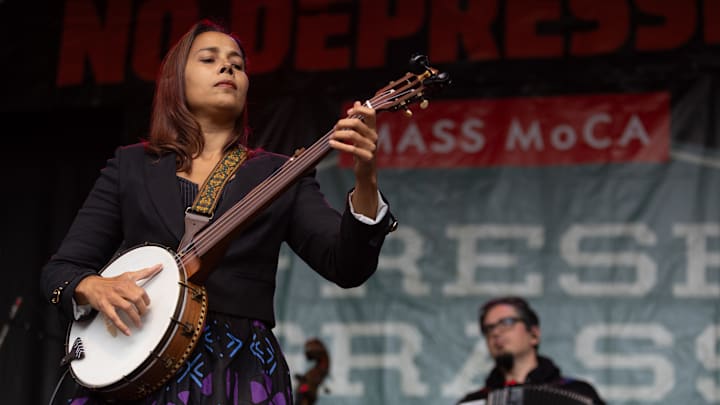Rhiannon Giddens is a Grammy-winner, Pulitzer-winner, and recipient of a MacArthur Genius Grant. She’s also a teacher. And like any good teacher, she allows her students room to fail, learn, and improve. So it was no surprise as she introduced the lead track off of her latest album as “Inspired by Aretha” and the crowd served up some modest applause, she fixed them with a stare. “Now, I know you can do better than that.” She then repeated the intro to loud and boisterous cheering. Giddens, in her most coquettish voice, then gave her approval. “See, I knew you could do it.”
Backed by her remarkably versatile five-piece band, Rhiannon Giddens proceeded to raise the roof at the Strathmore Music Center in Bethesda, Maryland on Monday night with the lead track from her latest album, “Too Little Too Late Too Bad.” That’s no small feat since Strathmore is one of the most beautiful, high-ceilinged concert halls in the entire mid-Atlantic. But it doesn’t seem to be much of a problem for Rhiannon Giddens.
Blending the best of American folk traditions with influences from Creole to Forro, and adding healthy doses of jazz, soul, and rock & roll, Giddens covers a wide swath of musical traditions. She is equally adept at singing bluesy love songs and belting out anthems on social justice. Almost every song she sings revolves around the broad concept of community, a topic she returns to again and again throughout her set.
Rhiannon Giddens amazes live at Strathmore Music Center
After setting the tone with the banjo-powered instrumental “Following the North Star,” Giddens ran through a series of love songs from every point in her career. The jazzy “The Love We Almost Had,” ”The Wrong Kind of Right” (from her latest album), and “Come Love Come” set out the wide borders of Giddens musical concerns. “Come Love Come,” a swampy spiritual about the way families were torn asunder by the cruelties of slavery, was the first of several social justice-themed numbers. Giddens, who has been lecturing and teaching alongside her singing for many years now, has a remarkable ability to slide important messages into her performances without hindering the joy of her music.
Those opening numbers also make clear just how versatile her bandmates are. Longtime accompanist Dirk Powell seemingly picks up a different instrument on every song. On the first three numbers, he cycled through fiddle, piano, and guitar. Later, he would pick up the small Cajun accordion. Collaborator/partner Francesco Turrisi alternated between accordion and organ throughout. Giddens, the generous frontwoman that she is, turned over parts of the set to each as they introduced and explained the songs that were being played.
Powell set up a medley of two Creole tunes and later Turrisi explained how he and Giddens came together – a couple of “music nerds” who loved the way old-time American folk music and Brazilian Forro have a lot more in common than many people think.
Giddens occasionally enlisted two other vocalists to help out. Opening act Charly Lowry sang on several songs before taking the lead on one of her own songs, “Backbone,” a tribute to one of her 19th-century relatives, Henry Berry Lowry. Henry Lowry was branded an outlaw when he fought against the oppression his native Lumbee people were facing. As she had made clear in her opening set, telling stories of her native ancestors and setting the historical record straight is the driving force behind Lowry’s work. Giddens said that she loved “Backbone” so much she decided to lend Lowry her band for a full-throttled version of the gospel stomp.
Telling stories of the forgotten also created one of the high points of the evening. Following the Aretha-inspired “Too Little Too Late Too Bad,” she told the story of Kalief Browder, the teenager who was arrested and held in captivity for three years without ever being convicted of a crime. He was brutalized at the notorious Rikers Island prison, and after his eventual release, committed suicide at the age of 22. Giddens’ nephew Demeanor joined her on stage to rap during her tribute to Browder, “Another Wasted Life.”
A couple of songs featuring guitar player Niwel Tsumbu kicked off the second half of the show, including the rousing guitar/banjo workout “Niwel Goes to Town.” Then Powell explained a couple of “old time tunes” – “God Gave Noah the Rainbow Sign” and the rollicking instrumental “Breaking Up Christmas.” The entire band, along with Charly and Demeanor gathered around the microphone for that old-time feel.
Giddens closed the main part of her show with another song from her new album “Yet To Be.” She didn’t have Jason Isbell (who sings with her on the album), but Powell filled in just fine on the hopeful tune. “Today may break your heart, but tomorrow holds the key – We’ve come so far, but the best is yet to be.” And she saved a little medley of Sister Rosetta Tharpe for an encore. As she had done all night, Giddens began with the heartfelt and somber “The Lonesome Road,” before launching into a joyous rendition of “Up Above My Head There’s Music in the Air.”
One final treat – as the lights came on, Demeanor asked the audience to stick around to help film Giddens’ very first (self-produced) TikTok video. Rhiannon Giddens - a traditionalist with her eyes cast firmly toward the future.
